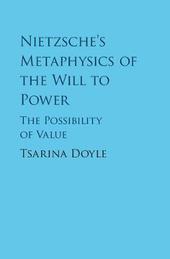
|
Nietzsche's Metaphysics of the Will to Power: The Possibility of Value
Hardback
Main Details
| Title |
Nietzsche's Metaphysics of the Will to Power: The Possibility of Value
|
| Authors and Contributors |
By (author) Tsarina Doyle
|
| Physical Properties |
| Format:Hardback | | Pages:248 | | Dimensions(mm): Height 235,Width 157 |
|
| Category/Genre | Philosophy
Philosophy - metaphysics and ontology |
|---|
| ISBN/Barcode |
9781108417280
|
| Classifications | Dewey:110 |
|---|
| Audience | | Professional & Vocational | |
|---|
| Illustrations |
Worked examples or Exercises
|
|
Publishing Details |
| Publisher |
Cambridge University Press
|
| Imprint |
Cambridge University Press
|
| Publication Date |
15 February 2018 |
| Publication Country |
United Kingdom
|
Description
Nietzsche's controversial will to power thesis is convincingly rehabilitated in this compelling book. Tsarina Doyle presents a fresh interpretation of his account of nature and value, which sees him defy the dominant conception of nature in the Enlightenment and overturn Hume's distinction between facts and values. Doyle argues that Nietzsche challenges Hume indirectly through critical engagement with Kant's idealism, and that in so doing and despite some wrong turns, he establishes the possibility of objective value in response to nihilism and the causal efficacy of consciousness as a necessary condition of human autonomy. Her book will be important for scholars of Nietzsche's metaphysics, and of the history of philosophy and science more generally.
Author Biography
Tsarina Doyle is Lecturer in Philosophy at the National University of Ireland, Galway. She is the author of Nietzsche on Epistemology and Metaphysics: The World in View (2009) and numerous journal articles.
Reviews'With clarity, verve, and philosophical sophistication, Tsarina Doyle shows that at the core of Nietzsche's thought stands the project of a naturalistic metaphysics. Nietzsche's value pluralism and his conception of a 'will to power' are rooted in the claim that mind, values, and norms are continuous with, yet irreducible to, the natural world. As such, Nietzsche's naturalistic metaphysics combines central features of Hume's radical naturalism and Kant's transcendental idealism. Drawing on both the history of philosophy and current arguments about nature and normativity, Doyle's book is a major achievement that, once again, highlights Nietzsche's continued relevance to current philosophical debates.' Christian Emden, Rice University, Texas
|